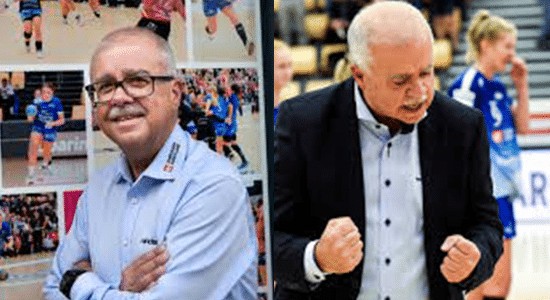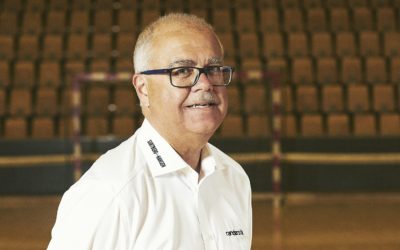Per Rasmussen, a handball business executive, has been involved with multiple handball organizations including Bjerringbro-Silkeborg, Randers HK, and Aarhus. As the very first handball business executive we’ve had on the SPort MAnagement (SPMA) Hub, I was excited to sit down and learn what he had to say about the great sport of handball [Håndbold in Danish]. While handball is not a popular sport in Canada and the United States of America, it is very popular in Denmark and other European countries, so much so that it is shown on national television. In my interview, I was curious about what the handball audience looks like, and was excited to learn more about the business side of it. Join me as Per Rasmussen answers some questions about the sport of handball, and discusses how he thinks we can bring the sport to North America.
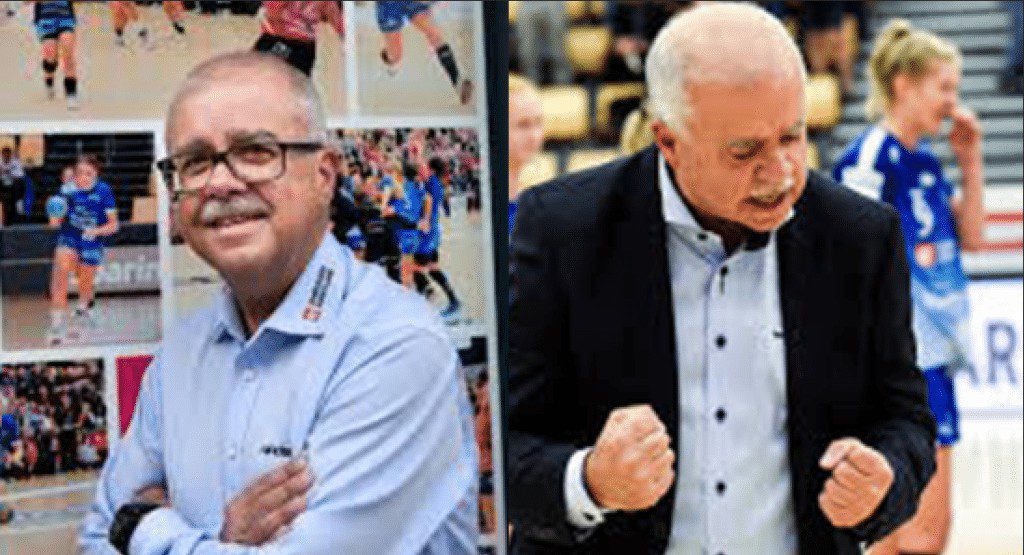
Please note: The interview with Per Rasmussen was conducted via a typed conversation in Danish. Editing changes were made to make it easier to read in English while maintaining the voice of the interview. We’ve also given you a version of Per’s answers in Danish. As English is our native language, please be advised there may be some honest errors when/if you read it in Danish.
1 You are the first handball business executive we’ve had on the SPort MAnagement (SPMA) Hub. Tell our audience a bit about handball and the business side of it.
Handball is a very popular product in Denmark, especially on the men’s side from a business perspective. Handball is shown on national television and certain stations have paid for the rights to be able to air games.
It is only football (or soccer as North Americans call it) that is stronger as a product in Denmark.
In the clubs that I have been managing, primarily in Bjerringbro-Silkeborg, we have focused on creating a wide range of strong business partnerships.

This means that even though we’ve had great support from Grundfos and Jyske Bank (two major companies in Denmark), we also open our ears to small organizations that seek to partner with us.
The premise behind having many partners is that the less sensitive you are if and when one decides to back out of a sponsorship deal at the last minute.
Handball is very privileged in Denmark. In other words, the sport of handball has led to many financial rewards in Denmark. By being shown nationwide in the country, it’s been easier to attract customers who prioritize watching handball in their leisure time.
I personally think the clubs are challenged by not getting enough money out of their television deal anymore though. And it’s a pity because handball clubs are dependent on TV revenues and sponsorship as their primary sources of revenue.
Much like it is for North American sport teams, our handball clubs have sales teams. They sell season and single games [just like they do at, say Maple Leaf Sports & Entertainment in Canada]. Ticket sales are one aspect of a much larger business, but an important one too. As managers, you are required to think outside the box and think of all the other ways you can sell your product/service.
In Bjerringbro-Silkeborg, for example, we worked extensively to create experiences and products that were not handball related. One example was networking groups.
Therefore, commercial products are crucial to our handball clubs set-up and in the long run!
You can also say that it is a disaster for a handball club when they move down into the first division. It’s kind of like the promotion and relegation system in the Premier League.

At the end of the day, and in the long run, clubs with a strong organization and sales efforts survive.

[nnr_optin_fire id=”17″]
Read Per Rasmussen’s Answer In Danish ??
Håndbold er jo et rigtigt populært produkt i Danmark og det er herrehåndbolden der rent forretningsmæssigt skaber større omsætning end damerne. Håndbolden bliver vist på landsdækkende TV – primært TV der har rettighederne hertil.
Det er kun som jeg ser det fodbolden der står stærkere i Danmark. I de klubber jeg har været direktør, primært i Bjerringbro-Silkeborg har vi haft fokus på at skabe bredden i samarbejdspartnere. Det vil sige at selvom vi har haft en fantastisk stor opbakning fra Grundfos og Jyske Bank, så har det været afgørende at vi havde produkter til både små og store sponsorer. Udgangspunkt har også være at jo flere samarbejdspartnere man har jo mindre følsom er man hvis der er en der holder pause.
Håndbolden er meget privilegeret ved at blive vist på landsdækkende hvilket jo betyder meget i forhold til at kunne tiltrække kunder der prioriterer TV. Når det så er sagt er TV aftalen ikke den bedste for klubberne. Jeg synes klubberne er udfordret på at de ikke får økonomisk nok ud af denne aftale. Det er ærgerligt synes jeg da en ligaklub først og fremmest er afhængig af TV indtægter samt sponsorindtægter. Nogle klubber er gode til at sælge sæsonkort til gode priser, men det er ikke der det rykker afgørende.
I Bjerringbro-Silkeborg arbejdede vi meget at skabe oplevelser og skabe produkter som ikke var håndboldrelaterede, herunder gjorde vi en del i netværksgrupper. Så kommercielle produkter er afgørende for dit set-up og på den lange bane, afgørende for din placering i den respektive. Man kan også samtidig sige at det faktisk er en katastrofe at rykke i 1. division. (2 bedste række), da der stort set ikke er nogen dækning herpå – i hvert tilfælde er medierne ikke med her. Alle klubber med en stærk organisation og salgsindsats overlever på den lange bane.
2 Your LinkedIn shows that you have been involved with multiple handball organizations. Tell us what your role across each is like.
a Bjerringbro-Silkeborg Elitehåndbold
In 2005, I helped get Bjerringbro-Silkeborg started [expansion franchise]. We created a strong organization, a robust brand and nearly sold out the arenas for all matches. Only a few years after we started the club, we were fighting for a top 5 position in the league annually, and revenues grew exponentially. So, I was part of the management team that set forth a strong foundation for many years of future success.
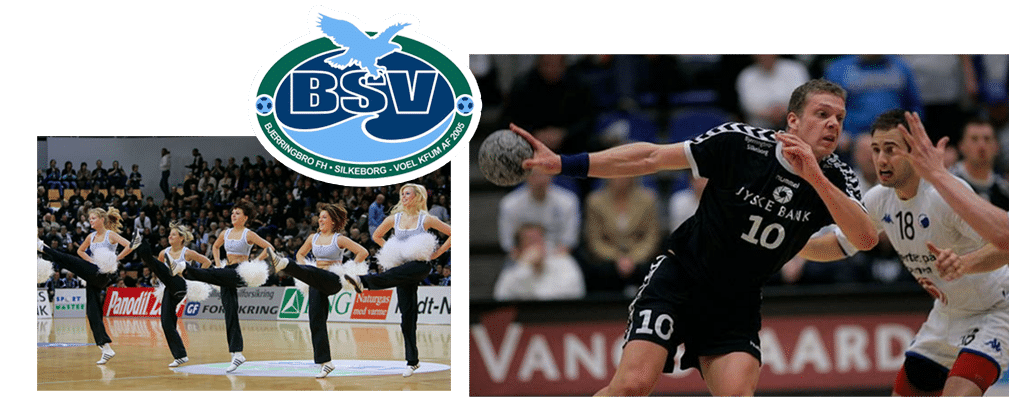
Today, Bjerringbro-Silkeborg Elite Handball Club is a title contender every year. They last won the championship in 2016 and play in the Champions League every single year. So, it’s right to say they have become one of the top professional handball clubs in the world.
b Randers HK
I think we created a positive story about the club (#randershkforfra). Many people bought in [to what we were doing] and, against all odds, generated a lot of publicity and support for the club – I definitely had the feeling that we were clear on the right path. We helped the club gain control over their expenses and revenues and acquired big sponsor deals with local companies.
On the playing surface, we put together a strong team but the team went on a long losing stretch. The result wasn’t the one we wanted. The arena had to be renovated and customers failed to follow us into the second year. We were pressed for liquidity and lacked necessary sales, which is why we, unfortunately, came close to folding.
The feeling that I couldn’t make a difference in Randers after this made me seek other avenues in my career. That is to say, we tried here with other non-handball related products, but it was not enough. Needless to say, I sincerely hope they succeed in the future!
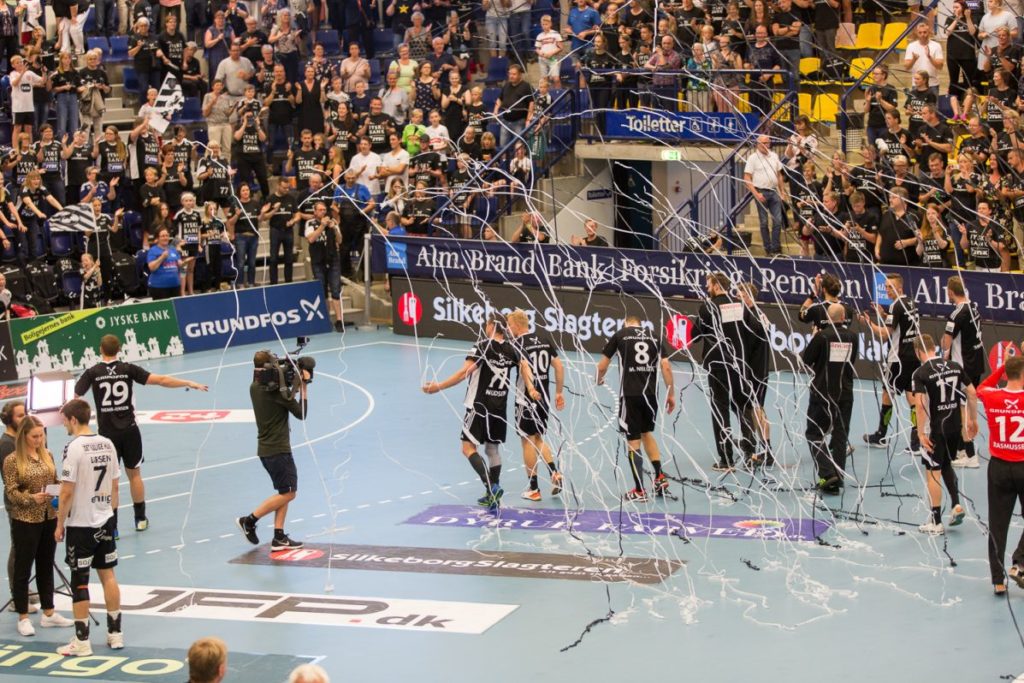
c Aarhus Håndbold
I think in a short time I was with the club, I was able to create a foundation from my own network, which came with Aarhus. That was good for the club. There was a lot of potential in the city with growth and, frankly, I think we were on the right path together. However, my vision and the board’s vision did not align as well as I hoped. So we separated without any kind of drama.
Read Per Rasmussen’s Answer In Danish ??
RANDERS HK:
Selvom jeg kom til Randers og man meldte et større underskud ud fra året før, synes jeg vi fik skabt den positive historie omkring Randers #randershkforfra og det var der mange der købte ind på og vi fik igen skabt meget omtale og opbakning – vi var klart på rette vej var følelsen. Vi havde også generelt styr på vores udgifter contra indtægter og vi fik tilført en del salg og fik et strækt hold til sæson men da vi tabte mange kampe i streg, hallen var under udvidelse og ja kunder svigtede år 2, jamen så kunne det ikke lykkedes. Vi blev presset på likviditet og manglende salg og derfor kom vi desværre tæt på at være lukningstruet. Følelsen af at jeg ikke kunne gøre en forskel i Randers efter det her, gjorde at jeg søgte andre veje. Det skal siges vi her prøvede med andre ikke håndboldrelaterede produkter men det var ikke nok – jeg synes Randers er en lidt svær størrelse når vi taler sponsorater. Men jeg håber inderligt man lykkedes hermed.
Århus Håndbold:
En kort tid – dog oplevede jeg at det var et godt produkt, et produkt hvor følelsen var at det var meget potentiale i en by med vækst og oprigtigt talt synes jeg vi var på rette vej sammen, men vi havde ikke helt fået forventinger til hinanden og derfor måtte vi skilles uden nogen former for dramatik. Men jeg synes jeg på den korte tid fik skabt et fudament fra mit eget netværk, som fulgte med til Århus og det ville man ikke vente på og tænker det er en kæmpe fejl, men sådan er det.
Men tiden var kommet til at sætte sportens verden på stand by. Man kan sige harpiksen blev udskiftet med øllen
3 Talk a little bit more about your over 11-year experience as the Commercial Director of Bjerringbro-Silkeborg Elitehåndbold.
The club is where they are today because we spent resources on getting the right structure in place for the organization. The use of resources to create a commercial approach and strategy to generate revenue long-term was important. We created a large network of customers around the club, which has led to many years of continued success for Bjerringbro-Silkeborg Elitehåndbold. It’s important not to overlook the importance of a strong sales strategy and put together a sales team to execute it. We didn’t overlook it and that’s a big reason Bjerringbro-Silkeborg Elitehåndbold is where it is today.
It made no sense that volunteers be in charge of or responsible for selling our product. I still advise professional clubs not to employ volunteers to be involved in sales for a professional club. I know it’s not a popular statement!
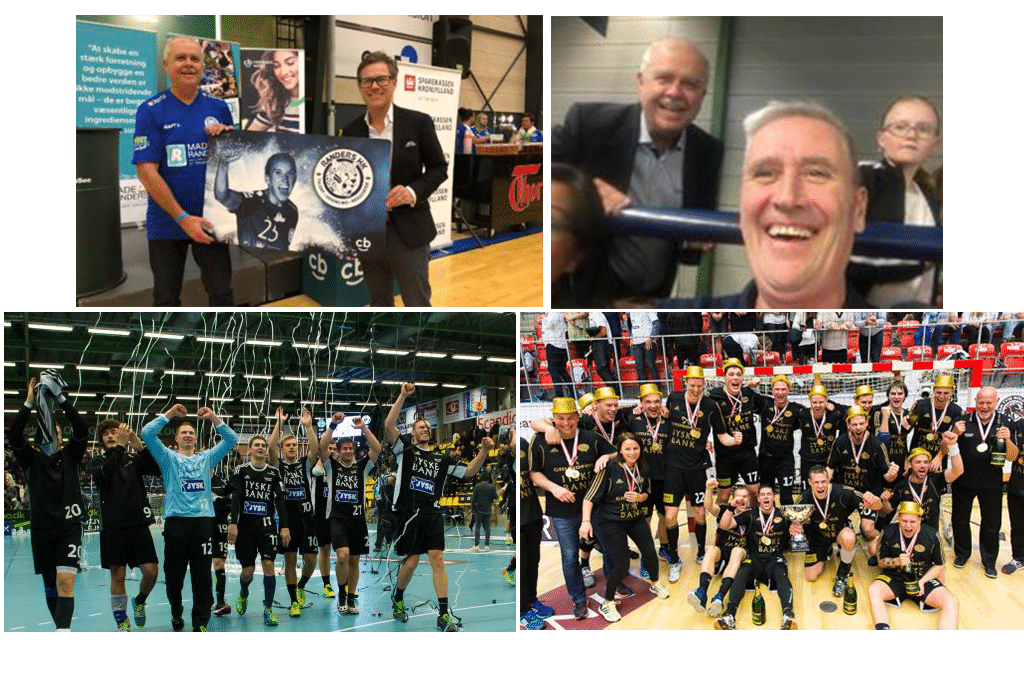
Bjerringbro-Silkeborg is a club that placed and still places financial responsibility at the forefront. So, it’s not like volunteers would have saved us money because we wanted to maximize our profit.
My experience was amazing, simply put!
Read Per Rasmussen’s Answer In Danish ??
Klubben er der hvor de er i dag fordi vi brugte ressourcer på at få styr på det bagved. Med det mener jeg organisationen herunder prioriteringen af salget. Det at man bruger ressourcer på at skabe en kommerciel tilgang til tingene og bruger tiden på at skabe indtægter det er alt afgørende og det at få skabt et stort netværk af kunder omkring klubben. Det kan ikke nytte noget at frivillige skal rende rundt og sælge til en professionel klub – sågar er min påstand også at det heller ikke altid dur i forhold til breddeklubber.
Bjerringbro-Silkeborg er en klub økonomisk ansvarlighed var i højsædet og prioritering af det ude bagved – derfor har denne rejse været særdeles brugbar for mig og rigtig spændende og er stolt over at have været med her. Synes det var dedikerede mennesker der var med og vi så ikke på klokken – vi knoklede hele tiden og det var bare det hele værd.274295&action=edit
4 What advice would you give to prospective sport management professionals looking to work in sport at a similar level to yourself but just starting off in their career?
Working In Handball Management Is Challenging & Rewarding
The fact that you always must have your game face on and constantly set the bar higher and higher for yourself and for the organization is both rewarding and challenging at the same time. It’s rewarding because it forces you to be sharper all the time, which means personal and professional growth.
What is challenging is balancing the grind of working in sports with your personal life. Work-life balance can be tough. It’s easy for your family to wonder why you must work so much. But I had my family’s support from the start and I continue to work all the time.
Not only balancing work and life is hard, but so is all the activities a handball business executive must do. It is all so rewarding though!
Being at the top of the mind with the media and maintaining good relationship between the clubs outside the field is so rewarding.
Advise To Future Sport Management Students
I’d advise prospective sport management professionals looking to work on the business side of handball to be ready to rock and roll from the start. You have to be trustworthy and bring forth a commercial and sales approach.
Everyone wants to be a sports manager. But it is very important that the finance, economics and sales are at the forefront of your professional approach.
Everyone wants to hang out with the high profile players and sit with the coach.
But forget that when you come to work every day – it totally doesn’t matter. Focus on the important thing: revenue. You will go a long way!
Read Per Rasmussen’s Answer In Danish ??
At man er klar på at knokle en vis legmesdel ud af bukserne og at man skal være troværdig og have en kommerciel og salgsmæssig tilgang til tingene. Alle vil gerne være sportschef, men det er altså meget vigtigt at økonomien og salget er i højsædet. Alle vil gerne omgås de højt profilerede spillere og sidde sammen med træneren. Glem det – det er totalt ligegyldigt. Fokuserer på det vigtige: Salgsindtægter.
5 When was the point you realized that you were meant to do this career? Take us through that realization.
I never played handball. But when I was first approached to work in handball business, I thought the fit was quite natural. I said yes because I wanted to move on from the commercial world and I had experience selling sponsorships.
When I first moved into the sports industry, I was really interested to learn as much as I could about our product. For example, my sports manager Jens Steffensen and I sat several Saturdays over red wine, beers and handball VHS tapes. We sometimes rewind back on those amazing moments we had. My passion was football (again it is soccer we are talking about here), but already as a youngster, I was inspired by the way a full stadium felt. So, the transition into the sports industry was easy.
Read Per Rasmussen’s Answer In Danish ??
Jeg har aldrig spillet håndbold, jeg sagde ja til projektet. Jeg tog vejen fordi jeg gerne ville videre fra den kommercielle verden og har solgt sponsorater for breddeklubber og var lidt inde over BFH, en af moderklubberne inden fusionen og det var i min verden ikke en ligaklub værdig – ud over det sportslige.
Derfor synes jeg det var spændende at bevæge sig ind i et område, som skulle være fuldtids og jeg vil også sige at da jeg ikke kendte produkter sad min sportschef Jens Steffensen nogle lørdage over rødvin og øl og VHS bånd og forklarede mig reglerne. Vi spolede nogle gange frem og tilbage. Min passion var fodbold og specielt dem der kunne score mål, men allerede som ganske ung blev jeg inspireret af hvis et stadion var fyldt og kunne godt lide at se events omkring en kamp. Så må skuffe Jer med at jeg ikke har spillet håndbold andet i Karup Skole på en udendørsbane hvor jeg scorede et mål…har altid gået op i at vinde.
6 What would you say are the top five qualities needed to be in your position?
1 Be Passionate
It is essential to be passionate about what you do for stable success long-term. You have to love what you do and be prepared to work a lot.
2 Focus On Sales
Having a focus on sales is so important. I place importance on this so that you can build on the product all the time and develop. This is the mindset that helped me created one of the powerhouses in Danish handball.
3 Possess Financial Responsibility
Be financially responsible and build the project up from zero, so it is connected
4 Comply & Cooperate With Partners
To comply with the agreements, you make and not sponsorships but cooperation agreements.
5 Believe In Your Product And/Or Service
Business development and finding your own profile so you know how to convince everyone no matter who they are to support your set-up.
Read Per Rasmussen’s Answer In Danish ??
Først og fremmest for at have været med til at opbygge et bæredygtigt set-up i form af en stærk administration. Som sagt er det altgørende for en stabil succes udenfor og indenfor banen.
Det at have fokuseret på salg så man kan bygge på produktet hele tiden og udvikle sig.
At være økonomisk ansvarlig og det at prøve at bygge tingene op så det hænger sammen.
At overholde de aftaler man laver og ikke lave sponsorater men samarbejdsaftaler.
Forretningsudvikling og det at finde sin egen profil og hvorfor skal vi støtte dit set-up..
7 Handball is as you might know an almost unknown sport in North America. With your own experience, what would you recommend that should happen to make handball a bigger sport?
Together, you have to create a strategy and a great marketing plan around the products. You have to continue to resonate with your audience through story telling. In addition, you have to make them be apart of what you are doing. Invite your target audience into the project.
At the end of the day, this isn’t something that will happen overnight. Making handball more recognizable in North America will require a targeted plan and I’d say it’d require a lot of work over a 5-10 year span.
At this point, North Americans visiting Denmark or other countries where handball is highly valued, are gaining the most exposure. But that exposure is limited.
It’s really hard to give you a full answer to this question! There are a lot of layers to it that’ll require a lot of planning and research. So, I’ll reserve that for a future discussion. ?
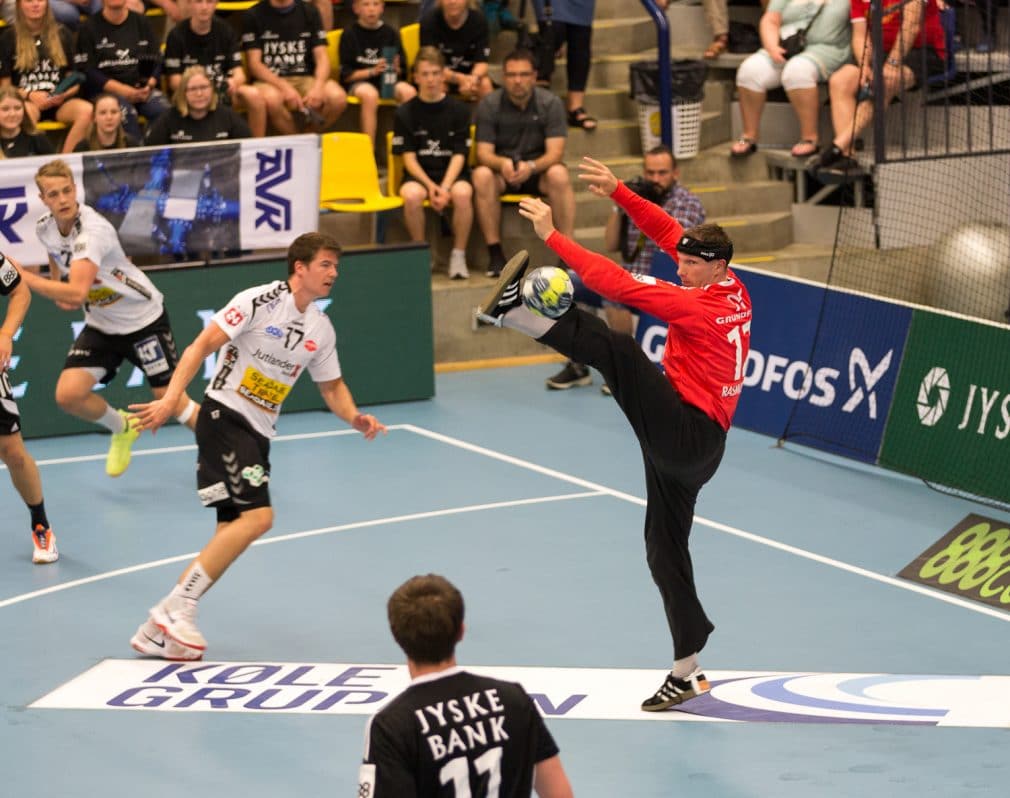
Read Per’s Answer In Danish ??
Vi skal sammen lave en strategi og markedsføring omkring produkter og finde nogle der er bannerførere herpå og så blive ved med at lave storytelling og invitere vores målgruppe ind i varmen så at sige. Jeg mener I bliver nødt til at finde en strategi, hvor jeg gerne deltager, og så melde en målrettet plan ud og jeg kommer til at sige at der kommer I til at bruge 5-10 år. Desuden kom til Danmark og bliv profileret eller et andet land. Tænker det her er et voldsomt omfattende spørgsmål, som jeg ikke kan komme helt i bund med lige nu og her.
Final Thoughts From Mads
The sport of handball may not be popular in North America overall, but it sure does make an impression in European countries like Denmark. But on the business side of things, it seems that handball is just like any sport, and you always need to “have your game face on”, working to constantly evolve and set the bar higher and higher. Will handball ever come to North America? Who knows. But I wouldn’t be surprised to see Rasmussen teaming up with some North American professionals to create a targeted plan that will bring handball into our future.
Per Rasmussen
Interview by Mads Schoening
Posted November 11, 2019 in Industry Profiles

